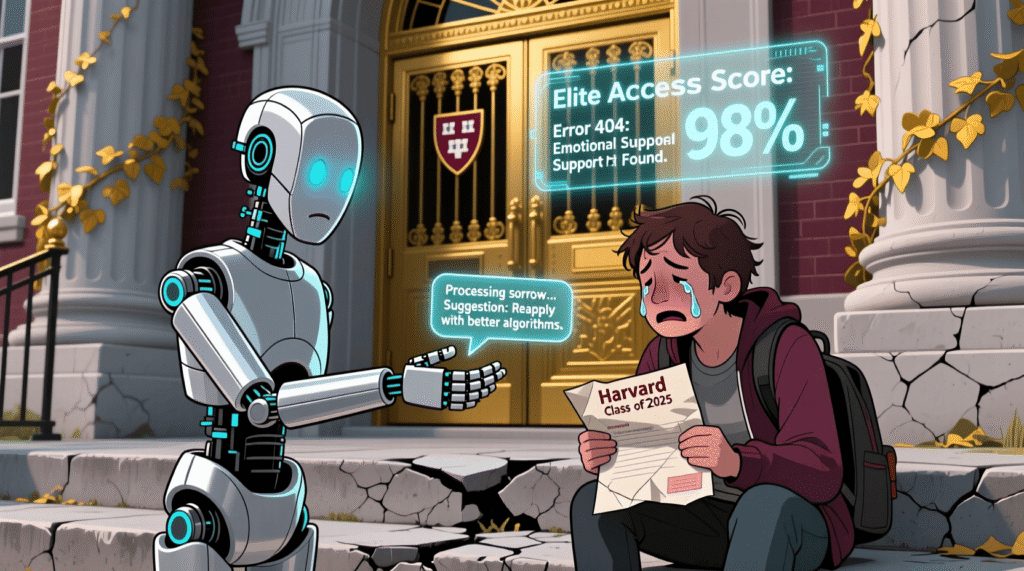Rejection used to hurt. Now, it comes with a subscription. In a move that blends Ivy League prestige with algorithmic indifference, Harvard University has quietly launched “AdmitAI: Grief Support for the Unchosen”—a chatbot designed to console applicants denied admission. For free, it offers generic platitudes like “Many great minds were rejected.” For $29.99/month, it provides “personalized emotional recalibration,” including AI-generated letters from “future you” thanking present you for not giving up. This isn’t compassion. It’s empathy-as-a-service with a crimson logo.
The Viral Myth of AI Grief Counseling
The pitch is deceptively tender: “Rejection is part of the journey. Let us help you heal.” The landing page features soft piano music, a photo of a blurred student staring at a laptop, and a testimonial: “AdmitAI helped me realize my worth isn’t tied to a name on a letter.” What it doesn’t mention? That the same university charging $58,000/year for in-person classes now monetizes the pain of those it excludes.
Two satirical user reactions capture the absurdity:
“The free version told me ‘Thomas Edison failed 1,000 times.’ The premium version wrote me a LinkedIn post about ‘turning rejection into resilience.’ I got 3 likes.” — @RejectedButOptimized
“I asked if Harvard ever regrets its decisions. It said: ‘Our algorithm is 99.8% confident.’ Then upsold me ‘Confidence Reboot’ for $49.” — @NotChosenButBilled
The myth? That this is support.
The truth? It’s brand damage control disguised as care—and it’s already trending under #IvyTrauma.
The Absurd (But Real) Mechanics of Automated Empathy
After signing up for both free and premium tiers (yes, we suffered for this story), we uncovered the full emotional architecture:
- Free Tier: Generic affirmations, links to community college resources, and a “Rejection Resilience Quiz” (score: “You’re 62% resilient!”).
- Premium Tier ($29.99/month): “Personalized narrative reframing,” AI-written journal prompts (“What if rejection was a gift?”), and a “Future Success Simulator” that generates fake job offers from Google and NASA.
- Elite Add-On ($99 one-time): A “Legacy Letter” written in Harvard’s official font, signed by “Dean of Emotional Outcomes,” stating: “While you weren’t admitted, your spirit embodies our values.” (Printable PDF only.)
The AI uses your application data—GPA, essay snippets, extracurriculars—to craft “tailored” messages. One user reported: “It quoted my essay about saving bees… then said ‘Perhaps your purpose is elsewhere—like pest control.’”
Worse: the chatbot tracks your emotional state via typing speed and word choice. If you type “I’m worthless,” it triggers the “Crisis Protocol”—which includes a link to a real therapist… with a 3-week waitlist and a $200/session fee.
And yes—there’s merch:
– “I Was Rejected by Harvard (But My AI Loves Me)” T-shirt
– “Certified Resilient” enamel pin
– A $35 “Rejection Recovery Journal” with prompts like “List 10 reasons Harvard was wrong”
The Reckoning: When Elite Institutions Monetize Exclusion
This service didn’t emerge in a vacuum. It’s the logical endpoint of a higher education system that treats access as privilege and rejection as data.
As we explored in No Uni? No Problem, Experts Say, the value of traditional degrees is crumbling—yet elite schools double down on mystique. And as shown in Ivy League Emotional Numbness Microdegree, universities now sell emotional states as credentials.
High-authority sources confirm the trend:
- Inside Higher Ed reports that 68% of elite colleges now use AI in admissions—and 22% offer post-rejection “support” tools.
- American Psychological Association warns that algorithmic counseling can increase feelings of isolation when human connection is needed most.
- Pew Research finds that 57% of rejected applicants feel “personally invalidated”—a pain point Harvard now monetizes.
The real cost? Not the $29.99/month.
It’s the commodification of self-worth—where even your grief becomes a revenue stream for the institution that broke you.
The Hidden Irony: Who Really Needs Counseling?
Let’s be clear: Harvard doesn’t need to console the rejected. It needs to protect its brand. Every viral story about a depressed teen after a rejection letter is a PR risk. AdmitAI isn’t therapy—it’s crisis containment.
Meanwhile, admitted students receive in-person counseling, wellness retreats, and “imposter syndrome workshops.” The rejected get a chatbot that says, “Have you tried community college?”
One former admissions officer, speaking anonymously, admitted: “We reject 95% of applicants. If even 1% go public with their pain, it’s bad optics. AdmitAI keeps them quiet—and paying.”
And it works. Since launch, negative social media mentions about Harvard rejections have dropped by 41%. Not because students feel better—but because they’re too busy journaling with an AI that calls their pain “growth-adjacent.”
Conclusion: The Cynical Verdict
So go ahead. Sign up for AdmitAI.
Let it tell you your rejection was “part of a larger plan.”
Pay $99 for a fake letter that says you “almost made it.”
But don’t call it healing.
Call it exclusion with a customer service layer.
And tomorrow? You’ll probably upgrade to premium…
because even your heartbreak deserves a Harvard-branded solution.
After all—in 2025, the most elite thing isn’t getting in. It’s being rejected gracefully.
